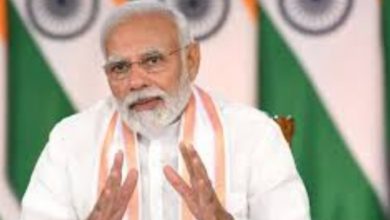OPEC move shows the limits of Biden’s F-Bump diplomacy with the Saudis

The move OPEC on Wednesday to reduce oil production sharply undercuts President Joe Biden’s effort to avoid an increase in gas prices before the midterm elections, while setting back his push to constrain the oil revenue Russia is using to pay for its war in Ukraine.
It also exposes the failure of his f-bump diplomacy over the summer with the crown prince of Saudi Arabia.
In both optics and substance, the decision OPEC and its allied oil producers underscored the challenges the United States faces in managing its foreign and economic policy at a time when the global economy is at risk of recession, and energy politics has emerged as a key component of the conflict in Ukraine.
The meeting in Vienna was attended Russia’s deputy prime miner, who is under U.S. sanctions. It came after a concerted but ultimately unsuccessful diplomatic effort Washington to halt the oil production cut, a signal that Biden’s influence over his Gulf allies was far less than he had hoped.
And it demonstrated anew that, even in an era in which oil should be diminishing in importance as a source of energy, OPEC+ acts in its own self-interests. In this case, sustaining the price per barrel has proved far more important to its members than making Russia pay a price for invading Ukraine.
A 3D-printed oil pump jack is seen in front of displayed OPEC logo in this illustration picture, April 14, 2020. (Photo Credits: REUTERS)
The meeting of the OPEC+ energy cartel, led Saudi Arabia and Russia, brought together an array of foreign and economic issues that affect everything from domestic politics in the United States to the war in Ukraine.
For days, the White House sought to prevent the cut of 2 million barrels a day. It called on some of its closest Arab allies — starting with Saudi Arabia, where Biden visited in July, and met with the crown prince, Mohammed bin Salman, over the objections of human rights organizations and even some of his own advisers.
He took the risk, officials said at the time, to address a variety of national security concerns — but mostly to increase the supply of oil — even if it meant withstanding the critique that he was partaking in the rehabilitation of Crown Prince Mohammed, who the CIA concluded approved the assassination of Washington Post journal Jamal Khashoggi in 2018. During his campaign for the presidency, Biden had called Saudi Arabia a “pariah.”
The quiet understanding emerging from the trip was that Saudi Arabia would increase its production about 750,000 barrels a day and that the United Arab Emirates would follow suit with an additional 500,000, pushing down gas prices and worsening President Vladimir Putin’s ability to fund a war that was stretching much longer — and with much higher casualties — than Biden had expected.
But the production increases were fleeting. While Saudi Arabia boosted production significantly in July and August, it backed away from the promise to sustain those levels over the rest of 2022. Its leaders, and all of OPEC, worried that the specter of global recession was driving prices down, from $120 a barrel over the summer to below $80. Below that level, they fear, budgets have to be cut, and social stability is threatened. So the Saudis decided they had to act.
The production cut announced Wednesday will reduce global daily production about 2%, though some of that is a phantom reduction because the group’s members were already underproducing from their own goals. But its effect on prices may be greater, upward of 15 to 30 cents a gallon at the pump, experts estimated.
And for Biden, with midterm elections only a month away, the timing could not be worse.
But beyond the inflationary and political effect, the decision shatters any sense that the Arab allies were signed up to the cause of making Russia, also a member of the OPEC+ group that met in Vienna, pay a price.
That should not have been a surprise. Iran is a member of the group, and it has grown closer to Russia in recent months, even selling it drones to prosecute the war in Ukraine.
The effort to cap prices for Russian oil is now in jeopardy. The OPEC+ decision helps Russia reap higher prices to offset the steep discounts it has been forced to give China and others, in return for their willingness to ignore the effort to isolate the country. In essence, the production cut will raise revenue for all the OPEC+ members, Russia and Iran included.
A photographer takes pictures of the Khurais oil field during a tour for journals, 150 km east-northeast of Riyadh, Saudi Arabia, June 28, 2021. (Credits: AP Photo)
In a statement from Jake Sullivan, the national security adviser, and Brian Deese, who heads the National Economic Council, the White House said Biden was “disappointed the shortsighted decision OPEC+ to cut production quotas while the global economy is dealing with the continued negative impact of Putin’s invasion of Ukraine.” They said he would “consult Congress on additional tools and authorities to reduce OPEC’s control over energy prices.”
For their part, the Saudis were unapologetic.
“We would rather be preemptive than sorry,” Prince Abdulaziz bin Salman, the Saudi oil miner, told reporters about the effort to bolster prices. He said nothing about the quiet agreements with Washington in July.
The degree of anger and surprise at the White House was obvious: On Tuesday, the press secretary, Karine Jean-Pierre, told reporters “we’re not considering new releases” from the nation’s Strategic Petroleum Reserve beyond what Biden had announced previously. On Wednesday morning, not 24 hours later, with the OPEC cut looming, a White House statement said “the president will continue to direct” new releases from the petroleum reserve “as appropriate to protect American consumers and promote energy security.”
“It’s clear that OPEC+ is aligning with Russia with today’s announcement,” Jean-Pierre said Wednesday.
If there is any lesson from Biden’s bitter experience, it is that the days are gone when American presidents could request favors from their Saudi allies and expect them to be carried out merely for the good of the relationship or to ensure the continued U.S. commitment to protecting the kingdom from foreign attacks.
Crown Prince Mohammed has deliberately danced himself from Washington, cultivating broader international relationships, notably with China and Russia. He has also made it clear that he does not view Saudi Arabia as a junior partner to the United States and that he is willing to shrug off any demands that he considers contrary to Saudi interests.
Since the start of the Biden adminration, this dynamic has played itself out in the interactions between the crown prince and Biden. But it was never clearer than in recent months, when Biden and his aides argued that the time had come to reset the relationship. That’s what the f bump symbolized. And the apparent Saudi agreement to increase oil output to help bring down global prices was part of the quid pro quo.
Wednesday’s cuts showed that the effects of that reset had been short-lived or that the Saudis did not consider the benefits of helping the United States after Biden’s visit enough to continue the favor.
Some analysts of Gulf politics saw the move as a direct strike at Biden.
“It is definitely political. It has nothing to do with money,” said Cinzia Bianco, a Gulf research fellow at the European Council on Foreign Relations.
The Saudis, she said, had been disappointed what they had received from the United States after Biden’s visit to the kingdom.
“So whenever it made political sense to backtrack and double down on a different strategy, they did,” she said.
Saudi analysts dismiss that characterization, echoing statements officials from OPEC countries that the cuts were made for purely technical reasons.
“It is certainly not a hostile, anti-Biden act,” said Ali Shihabi, a Saudi analyst. “It has nothing to do with Biden. It is to keep the price in an acceptable band.”
Shihabi said that oil was so fundamental to the Saudi economy and to Crown Prince Mohammed’s plans that ensuring that the commodity remained lucrative trumped other concerns.
“They are just trying to preserve their economic lifeline,” he said. “This is the lifeline in the kingdom, and everything depends on it in the kingdom.”





